Top News
May 9, 2017 Ryukyu Shimpo
By Takumi Takimoto
As we look towards the 45th anniversary of Okinawa’s reversion to Japan, while approval ratings of the reversion in a recent public opinion poll of Okinawan residents remain high, they are at their lowest point since similar questions began appearing in the poll 20 years ago. Meanwhile, for the first time, the largest response to “Downsides of the Okinawa Reversion” was, “Damage from U.S. bases.” Despite growing demands for the consolidation and reduction of U.S. bases since the reversion, the unchanged situation surrounding the bases has cast a dark shadow over the hearts of Okinawans.
In addition to accidents and incidents related to the U.S. military such as the crash of the Marines’ MV-22 Osprey at the end of last year, and the violent murder of a woman by a base worker, the forced landfilling by the Japanese government as part of the relocation of MCAS Futenma to Henoko, Nago filled survey responses.
At the center of this is the fact that while 20 years ago 75% of all land used for U.S. military facilities in all of Japan was in Okinawa, currently it is still at around 70%. Demands for the reduction of bases and return of the land in the Japanese and Okinawan policies by Okinawan residents is at its highest point in five years, and furthermore the proportion of responses calling for these policies is at an all-time high. The contrast of the governments claims of “a reduction of the burden on Okinawa,” and the un-met demands of Okinawan residents is reality surrounding the 45th anniversary of the Okinawa Reversion.
The Japanese government staged the start to landfill construction in Henoko Bay, related to the relocation of MCAS Futenma to Henoko, at the end of April, emphasizing the progress of the construction both inside Japan and abroad. This is in spite of the fact that 74.1% of people demanded that MCAS Futenma be moved either outside of Okinawa, outside of Japan, or demolished, well above the number of people who accepted or supported the construction. Public opposition to the Henoko relocation remains as strong as ever, and it reveals that the government’s forced construction is not linked to an evocation of a “mood of resignation” on the part of Okinawan residents.
Furthermore, Governor Takeshi Onaga’s approval rating is at 66.7%, much higher than the approval ratings of Masahide Ota, Keiichi Inamine, and Hirokazu Nakaima, which all fell between 34-37%. There is growing pressure on Gov. Onaga’s decision to revoke the permit for filling Henoko Bay, however it can be said that the responses show a renewal of support for Onaga as one who will stand up to the Japanese government.
(English translation by T&CT and Sam Grieb)
Go to Japanese
May 9, 2017 Ryukyu Shimpo
On May 8, ahead of the 45th anniversary of Okinawa’s reversion to Japanese sovereignty on May 15, Ryukyu Shimpo finished conducting an Okinawa prefectural public opinion poll by telephone. Out of the respondents, those that said the reversion was either “very good” or “rather good” reached a total of 75.5 percent. Three out of four persons contacted responded to the poll, a 4.5 percent drop from a similar public poll conducted five years prior.
Regarding relocation of Futenma Air Station from Ginowan City, 74.1 percent of respondents demand the immediate removal of the base outside of Okinawa or outside of Japan. Approval of the current plan to build a replacement facility in Henoko, Nago, reached 18 percent, much higher than in the prior poll.
Each respondent was allowed to choose up to three reasons why reversion of Okinawa to Japanese sovereignty was positive. Out of respondents, 50.5 percent say it is because cultural and information exchange with mainland Japan has increased; 50 percent feel that infrastructure such as roads, bridges, and ports have been better maintained. Below the half-of-respondents mark, 40.7 percent think that medical services and welfare have improved, 32.4 percent say education has improved, and 20.2 percent feel that Okinawans’ have richer lifestyles. Only 4 percent answered that harm from US military bases has decreased.
On the other hand, respondents were also allowed to choose three reasons why reversion was negative. Many more people think harm from US military bases has increased at 43.7 percent of respondents, 36.2 percent say nature has been destroyed, and only slightly less at 36 percent feel the cost of living has risen. There are also those who think that Okinawan traditions and culture are fading at 22.9 percent, and 21.1 percent are concerned at Okinawa’s population decline due to Okinawans leaving the islands and other causes.
Respondents could also choose up to three measures they want to see the central government and Okinawan government pursue. Most, at 43.7 percent, wanted to see the consolidation and reduction of US military bases as well as utilization of former base land. Other measures desired are promotion of the tourism industry at 31.1 percent, improvements to social welfare at 28 percent, and promotion of education and culture at 27.3 percent.
There is a large disparity concerning the current concentration of US military bases in Okinawa. While 70 percent think the situation is unjust, only 24.7 think it is unavoidable.
Concerning the US-Japan Status of Forces Agreement (SOFA), 43.3 percent want it substantially amended and 25.8 percent think its implementation should be improved. However, 17.1 percent want the SOFA to be discarded along with the US-Japan Treaty of Mutual Cooperation and Security, and 8.4 percent feel the SOFA is fine in its current state.
The poll also addressed Governor Takeshi Onaga’s approval rating. Of those who responded, 66.7 percent support him, 19.3 percent do not support him, and 14 percent are unsure.
(English translation by T&CT and Erin Jones)
Go to Japanese

February 3, 2017 Ryukyu Shimpo
On January 24, Katsuya Yonemori, a 21-year-old from Tomigusuku City because the first Japanese to win second place in the freestyle category of the SIGEP 2017 Gelato World Cup. About 150 people from around the world competed in this category. Despite having only a year of experience as a gelato artisan, Yonemori is the shop manager of La Vous, a gelato shop in Ginowan City. Having achieved a remarkable accomplishment, Yonemori voiced his ambition in the following: “[I] want to make gelato using ingredients specifically from Okinawa and to share it with the rest of the world.”
Yonemori titled his gelato, “Aroma of Earth,” which combined beets, mint leaves, rosemary, and Okinawan lemon. Beets are often used only for coloring. But rather than doing just that, Yonemori made beets the centerpiece, brought out the vivid color and sweetness of it and fused it with the sourness of lemon. This resulted in the refreshing taste that gave it its high marks.
Yonemori was enthusiastic. He said, “Last year, when [I] accompanied my mentor to participate [in the Gelato World Cup, I] learned that vivid colors are favored. That gave [me] the idea to use beets. [I’m] so overwhelmed by the gravity of the award, [I] could explode. [I] hope to take home first prize during the Japan competition this coming September.”
Taizo Shibano from Ishikawa Prefecture is Yonemori’s mentor and is the first Asian to be appointed as a world gelato ambassador. He was thrilled about Yonemori’s accomplishment and said, “[Yonemori] thinking outside of the box and [his] idea to use the beets as the centerpiece is what got it its high marks. I’m ecstatic.” “Aroma of Earth” will be rolled out sequentially at the four La Vous shops in Okinawa starting February 3.
This year was the 38th Edition of SIGEP, which drew in 200-thousand people and is the world’s biggest exhibition that specializes in gelato. The competition is held every year during the exhibition and is evaluated from various angles, such as flavor composition, color, and innovation.
Photograph:
Katsuya Yonemori who won second prize at the Gelato World Cup, taken on February 2 at La Vous in Ginowan City.
(English translation by T&CT and Chelsea Ashimine)
Go to Japanese
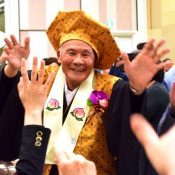
May 4, 2017 Ryukyu Shimpo
Ginowan Rotary Club held a party to celebrate Dr. Yoshio Tanaka reaching his 100th year. Dr. Tanaka is currently 99 years old. One hundred and fifty people gathered to celebrate at the party.
Tanaka was born in Taiwan in 1918. He learned about a shortage of medical doctors in Okinawa in 1975 and got involved in improving communal medical care in Okinawa. He serves as the director of the Akamichi Clinic in Akamichi in Uruma City and sees his patients regularly to this day.
In addition to the Ginowan Rotary Club, Taiwanese rotary club members and patients also attended the event and handed him flowers and gifts. All the participants then danced the traditional “kachaashi” to congratulate Dr. Tanaka on his long and healthy life.
Tanaka showed his gratitude, saying “thanks to you all I am able to have the happiest birthday celebration in the world. Thank you.” He added, smiling, “I would like to keep going for ten more years. I hope to share energy with you all so you can stay healthy and well with dreams and hopes.”
(English translation by T&CT and Sayaka Sakuma)
Go to Japanese
May 3, 2017 Ryukyu Shimpo
With the approach of Constitution Memorial Day on May 3, the Ryukyu Shimpo conducted a public opinion poll of Okinawans at the end of April. The poll was conducted by telephone and included questions about the revision of Article 9 of the constitution, including its clauses on war renunciation and non-maintenance of war potential, as well as about the proposed revision of the Act on Punishment of Organized Crimes, which includes a clause on the crime of conspiracy. With regard to Article 9, the largest number of people, 44.2%, stated they believe it should be maintained, this number exceeding the number of those who said it should be revised, 21.7%, by 22.5 percentage points. These numbers once again indicated that although Prime Minister Shinzo Abe is intent upon revising the constitution, including Article 9, there is strong support for maintaining Article 9 in Okinawa.
Regarding the “crime of conspiracy,” which is currently under debate in the Diet, 34.4% of respondents said they are opposed, more than 19.2 percentage points higher than the 15.2% who said they were in favor of the related law. Meanwhile, 46.8% answered “I can’t say either way.” In addition to the strong opposition, it was also clear that insufficient debate has left many people unable to make a decision.
Regarding the crime of conspiracy, by gender, 17.5% of men and 13.1% of women were in favor of a law rendering it a punishable offense, while 37.7% of men and 31.1% of women were opposed. Respondents answering “I can’t say either way” were 43.8% of men and 49.7% of women.
Regarding revision of Article 9 of the constitution, a telephone poll conducted by the Ryukyu Shimpo in 2014 showed 60.9% of people responding that “Article 9 should be maintained and not changed.” In a poll conducted by the Ryukyu Shimpo and Okinawa Television Broadcasting Co., Ltd. (OTV) in 2015, 70.2% of respondents said that “it is not necessary to revise” Article 9.
In the present poll as well, many respondents called for Article 9 to be maintained, but the proportion decreased compared to previous years. Meanwhile, compared to the roughly 4% to 5% of respondents who answered “I don’t know” in 2014 and 2015, in the present survey, 32% of respondents answered “I can’t say either way” and 2.1% responded “I don’t know”, indicating that the number of people unable to express either support or opposition increased. It appears that people are finding it difficult to make a decision in today’s tense international environment, with the issues of North Korea’s nuclear and missile development and China’s maritime advancement.
Regarding Article 9, by gender, 27.9% of men and 15.8% of women responded that it should be revised, while 40.3% of men and 47.8% of women responded that it should be maintained. Meanwhile, 30.6% of men and 33.3% of women responded, “I can’t say either way.”
The poll was conducted on April 29 and 30 and solicited answers from eligible voters 18 years and older living in Okinawa Prefecture. It was conducted using random digit dialing (RDD), a method by which phone numbers are randomly generated by a computer and called. Phone calls were made to 1,141 households having at least one eligible voter, and responses were received from 525.
(English translation by T&CT and Sandi Aritza)
Go to Japanese
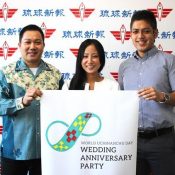
May 4, 2017 by Ryukyu Shimpo
Nago – The Wedding Anniversary Party executive committee is planning on holding an annual celebration for people who couples who get married on October 30, to raise awareness for World Uchinanchu Day, which takes places the same day. The co-leaders for the event are World Uchinanchu Day advocates Andrés Higa, 42, a third-generation Okinawan-Argentinian, and Andrés Isaki, 27, third generation Okinawan-Peruvian, and Minami Tamamoto, 29, head of the executive committee for the Fifth World Youth Uchinanchu Festival.
The three organizers recently paid a visit to the Ryukyu Shimpo’s northern branch office. The executive committee will host a wedding party for five couple who get married on Uchinanchu Day, celebrated as “A day for the couples’ love and friendship.” The total budget is 2,000,000 yen. The executive committee is currently looking for the five couples as well as sponsors.
Andrés Isaki said, “We would like the day to have a global flavor in the image of the World Uchinanchu Festival.” Tamamoto added, “I would like the day to be remembered by all Uchinanchu, and used as a day to exchange gifts with one another, similar to Valentine’s Day.”
(English translation by T&CT and Sam Grieb)
Go to Japanese
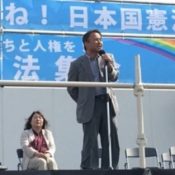
May 3, 2017 Ryukyu Shimpo online edition
To mark 70 years since the constitution came into effect, the May 3 Constitution Rally met in Tokyo Rinkai Disaster Prevention Park in Koto Ward, Tokyo. According to the organizers 55,000 people attended, pledging to protect the constitution, to support cancellation of new base construction, and to oppose “conspiracy crimes” being incorporated in the Act on Punishment of Organized Crimes. Chairman of the Okinawa Peace Movement Center Hiroji Yamashiro, who had previously been arrested and detained on suspicion of several offenses including inflicting bodily injury during protest activities, attended the rally and called for solidarity.
Yamashiro says that the Japanese government starting embankment work in Henoko, Nago, is no reason to lose heart, and that the central government cannot conduct land reclamation work. He insists that candidates supported by the Japanese government must win the Nago mayoral and Okinawa gubernatorial elections next year for the base to actually get built.
In regards to a bill to revise the Act on Punishment of Organized Crimes and incorporate “conspiracy crimes” that is currently being deliberated in the National Diet, Yamashiro speculates that the revision may be an effort by the Japanese government to block the opposition movements of Okinawans and their allies nationwide. He encourages people to work together to bury this effort by the central government.
Leaders of Japan’s Democratic Party, Communist Party, Liberal Party, and Social Democratic Party also participated in the rally. They announced that their appeal, titled “Nationwide United Signatures Calling for Respect for the Okinawan People’s Will and Retraction of Forcing Bases on Okinawa,” which requests the cancellation of new base construction in Henoko, has now collected 1,400,000 signatures nationwide including those already submitted to the National Diet.
(English translation by T&CT and Erin Jones)
Go to Japanese
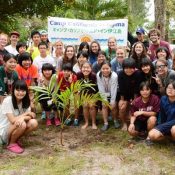
April 30, 2017 Ryukyu Shimpo
By Hiroe Nakagawa
High school students from Forest Lake Christian School in California and program leaders, 12 people altogether, stayed on Ie-jima the week of April 11 through April 17. These students volunteered in providing English lessons for elementary school pupils and an outdoor camp for junior high pupils in Ie Village.
The volunteer work is affiliated with an Ie Village project for global human resource development. Ralph Justiniano of Encompass Japan (based in Tokyo), as well as foreign instructors and students of Okinawa Christian School International in Yomitan Village collaborated on the program, jointly sponsored by the Ie Village Board of Education and Kumon Ie’s Ie West School.
This program, called Camp California in Ie-jima, is in its second consecutive year. On April 13 and 14, the volunteers visited two elementary schools in Ie Village, socializing with local students through games and other activities. They showed the local students videos of elementary school lessons in America, addressing the differences in school life between America and Japan.
On April 14 through 17, the program conducted an English immersion camp for junior high pupils at Ie Island Seishonen Ryoko-mura Campsite. At the camp participants communicated in English and enjoyed American-style meals, campfires, songs, and games. On April 16, the campers celebrated Easter and were introduced to the tradition of Easter eggs. Local participants said that they have acquired English listening skill through the immersion, and they are able to speak English more naturally. It was an enriching cultural exchange.
Ie Village junior high third-year pupils Emika Tamashiro and Shigeru Gushikawa said that since their participation last year, they have gotten better at English listening comprehension. Because they still cannot express themselves well in English, they would like to study more and have a homestay experience in America.
(English translation by T&CT and Erin Jones)
Go to Japanese
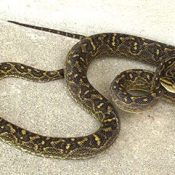
May1, 2017 Ryukyu Shimpo
Okinawa Prefecture issued a habu-bite warning on May 1, as it anticipates increased habu activity as summer kicks off. In recent years, while there has been almost no cases of people dying from a habu bite, each year tens of people are bitten by the viper. There are many cases of people suffering from permanent damage after being bitten, and as such Okinawa Prefecture is calling for caution.
In 2016, there were a total of 56 reported cases of people being bit by habu. The majority of cases involve males with 42 reported bites, and 14 cases involving females. By type, there were 37 cases of habu bites, 5 cases of hime-habu bites, 13 cases of Sakishima-habu bites, and 1 case of a Taiwan-habu bite.
According to the prefecture, many cases involve people who work outside including bites that occurred when moving flower pots, harvesting fields, and raking leaves. Most of the cases involved extremities, with 25 bites occurring on the fingers, and another 10 on the lower leg.
In the notice, Okinawa Prefecture warns residents and visitors to take care by (1) making it hard for habu to inhabit or invade area by cutting grass short and exterminating mice, (2) taking proper caution when going in or out of rice paddies, mountain trails, and fields, as well as when walking at night and, (3) If you are bit by a habu, do not move quickly and get someone nearby to assist you.
(English translation by T&CT and Sam Grieb)
Go to Japanese
April 28, 2017 Ryukyu Shimpo
On April 27, the National Transportation Safety Board released a survey report about a case in June 2015 where a helicopter of the Japan Air Self-Defense Force (JASDF) crossed over the sky ahead of an All Nippon Airways (ANA) aircraft that was taking off, leading to a near collision. The report pointed out that a misunderstanding of instructions from the air traffic controller by the pilots of the JASDF helicopters caused the confusion.
The incident occurred on June 3, 2015. The JASDF helicopter flew across the front of the ANA aircraft taking off at Naha Airport. The ANA aircraft ceased takeoff. Immediately after that, the Japan Transocean Air (JTA) aircraft, which had obtained permission to land from behind the same runway, landed and stopped about 570 meters behind the ANA plane.
According to the report, the pilot of the JASDF helicopter mistook the takeoff instruction to the ANA aircraft as an instruction for himself. Moreover, visual checking was insufficient, and the pilot was late noticing the ANA aircraft that had been running.
On the other hand, the JTA aircraft that entered the runway from the back was already landing when the aircraft confirmed the instructions from the controller to redo the landing. The survey report says, “[the redo instruction] missed the timing.”
(English translation by T&CT and Megumi Chibana)
Go to Japanese
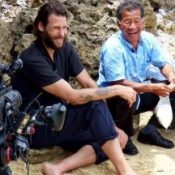
April 26, 2017 Ryukyu Shimpo
A group of reporters from an online webcast from US CNN television, Great Big Story, visited a seafood processing company called Itosan in Itoman City on April 24 and 25 to hear from CEO Tadashi Oshiro about mozuku harvesting and his passion for the product. This is the first time for the program to cover an Okinawan individual. The program reported on Mozuku because it is a rare industry not seen outside of Okinawa. The program will be posted on Facebook as early as May.
The program covers overlooked jobs that work with the natural environment around the world. The facebook page has been liked by four million users and watched throughout the world.
CEO Oshiro talked about carrying on the tradition of the industry, “I am here today because of my father who I learned a lot from. I have to pass down what I have learnt to my son and the next generations.”
Asked about the importance of being connected to nature, Oshiro emphasized the need to appreciate surrounding nature.
“Humans can be selfish if we lose our sense of empathy for the natural environment. I think that taking our nature for granted and not appreciating it can lead us towards wars.”
The reporters filmed mozuku harvesting and underwater footage on April 24 using drones. On the next day CEO Oshiro introduced some mozuku dishes. He introduced menus including yushi dofu mozuku soup, which he learned from his grandparents, mozuku salad, and mozuku hamburger patty.
Photograph: Itosan CEO Tadashi Oshiro answers in a interview by CNN reporters
(English translation by T&CT and Sayaka Sakuma)
Go to Japanese







 Webcam(Kokusai Street)
Webcam(Kokusai Street)


